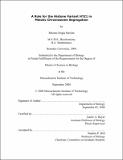A role for the histone variant HTZ1 in meiotic chromosome segregation
Author(s)
Meislin, Shlomo Hogla
DownloadFull printable version (3.578Mb)
Other Contributors
Massachusetts Institute of Technology. Dept. of Biology.
Advisor
Laurie A. Boyer.
Terms of use
Metadata
Show full item recordAbstract
In Eukaryotic cells, the packaging of genomic DNA into chromatin has important consequences for all DNA-dependent transactions. Chromatin structure is highly regulated by a variety of complex processes that are not well understood. These include nucleosome remodeling and post-translational modification of histone proteins (Dunn & Kingston, 2007; Kouzarides, 2007; Workman, 2006). An additional mechanism for chromatin regulation is the replacement of conventional histones with specific non-allelic variants. H2AZ, a highly conserved variant of histone H2A, is of particular interest because it is essential for viability in multicellular organisms and it has been implicated in many distinct and even contradictory functions. Despite extensive evidence implicating H2AZ in maintenance of genome stability, centromere structure and function, and chromosome segregation, a role for H2AZ in meiosis has not been investigated. The budding yeast Saccaromyces cerevisiae, a classical model for cell division studies, constitutes a highly amenable system in which to approach this question. In this study, deletion of the S. cerevisiae H2AZ homologue, Htz1, resulted in classical meiotic defect phenotypes such as reduced sporulation efficiency, impaired spore viability, and displayed a reduced ability to progress through meiosis. Htz1 deletion strains also showed an increase in chromosome nondisjunction during both meiosis I and II and premature sister chromatid separation during meiosis I. These results suggest a novel role for H2AZ in regulating meiotic chromosome segregation and possibly in centromeric protection and kinetochocore co-orientation and further illustrate how defects in H2AZ function may contribute to human diseases such as cancer.
Description
Thesis (S.M.)--Massachusetts Institute of Technology, Dept. of Biology, 2008. This electronic version was submitted by the student author. The certified thesis is available in the Institute Archives and Special Collections. Includes bibliographical references (leaves 36-42).
Date issued
2008Department
Massachusetts Institute of Technology. Department of BiologyPublisher
Massachusetts Institute of Technology
Keywords
Biology.